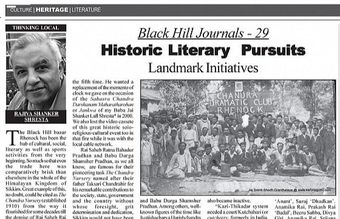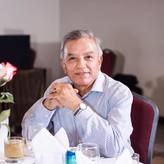Thinking local
Black Hill Journals - 29
Historic Literary Pursuits
Landmark Initiatives
Rajiva Shanker Shresta

Rai Saheb Ratna Bahadur Pradhan and Babu Durga Shamsher Pradhan, as we all know, are famous for their pioneering task The Chandra Nursery named after their father Taksari Chandrabir for his remarkable contributions to the society, state, government and the country without whose foresight, grit determination and dedication, Sikkim would not have been what it is today nor we. Many, however, do not know how they were also behind for sowing the seeds of literature in the soils of Sikkim as well. Some excerpts translated for the benefit of my readers is given here from the dissertation 'Sikkimma Sahityako Sfuran ra Pragati' by none other than the well-known literary face from this place, Dr. Shanti Chettri. She was delivering her findings for Madan Vyakhyanmala 2016 in Varanasi last year to a literary gathering while being conferred with the prestigious Madan Smarak Samman, equalled to what is Madan Puraskar in Nepal by none other than the doyen of Nepali literature Kamal Mani Dixit* during similar function that I attended in Siliguri earlier last year to honour then ailing Kitab Singh Rai* with Madan Smarak Samman 2015. I get this confirmed by my friend Prem Pradhan, the convener for the Nepali language in the Sahitya Akademi, who too was present along with Durga Dai of the Uday, Dr. Jiwan Namdung and many literary faces of the society there. The other receipients of the Madan Smarak Samman from Sikkim are Tulsi Ram 'Kashyap'* and Sanu Lama. Lama was conferred with in a similar function held at Siliguri that I happened to attend way back in 2000. Here Lama had Sikkimma Nepali Sahityako Gatividhi for Madan Smarak Vyakhyanmala. It was a rare opportunity for me to be the chief guest on similar function while in Banaras for bringing out our 'magnum opus' Sikkim : Three Decades towards Democracy in the year 2005 and hand over this prestigeous Madan Smarak Samman to K. B. Nepali* of Lumding, Assam for his remarkable contributions to Nepali literature including the literary quarterly Bindu for more than half a century. Bangshree Krishna Singh Moktan, known for his classic novel Charandhuli since our school days, was similarly conferred with this Madan Smarak Samman in 2013 and the octogenarian travelled all the way to Banaras for the love to be in this ancient holy city once again very much like our Dr. Shanti Chettri last year!
"Human being first tries to know the society he finds himself located in. Sometimes society makes one popular while it is him/her who raises the society high up. We can, therefore, say that human being, society and literature are complimentary to each other. Literature provides both education and entertainment as well. Dramatics recognized as the fifth Veda after four Vedas being included in the literature fold, I could claim that it was my birthplace Rhenock Bazar where the seeds were first sown and germinated and safely vouch for it because of Chandrabir Taksari and The Chandra Nursery, the names well-known in Sikkim since the days immemorial. First such literary activity generally believed to have started in Sikkim was the Apatan Sahitya Parishad in 1950, whereas Chandra Dramatic Club was already established in 1930! It was started here under the leadership/patronage of Rai Saheb Ratna Bahadur Pradhan and Babu Durga Shamsher Pradhan. Among others, well-known figures of the time like Jyotishacharya Harishchandra Sharma, Tulsi Prasad Pradhan, Harka Lall Pradhan, Lalchand Agrawal, Kesang Wangdi and Durga Prasad Pradhan were seen in the group of some 50-55 people in the picture taken (in front of the Kothi) was a wonderful team.
"In early days human being expressed their feelings of joy through dialogue, acting and singing. There being no easy/convenient printing facility available, hand-written dramas might have served the purpose. I remember that the same club had staged dramas written by Paras Mani Pradhan* 'Satya Harishchandra', 'Balak Dhruva', 'Gautam Buddha' and other social plays on temporary stage prepared for the purpose in the decade 1950-60. World War period of 1940-45 might have put all such activities to a halt. It can, therefore, we can staunchly vouch and safely conclude that the foundation stone for literature in Sikkim was first laid by the Chandra Dramatic Club of Rhenock.
"By 1869 the Company government had started providing education by opening primary schools in Sikkim as well. Many Nepalese people from Nepal were brought in Sikkim for various activities like mining, agriculture, roads and bridges, forest and business. It was at Rhenock that in 1980 there was a big fight to protest their growing influence. A police station, therefore, was started (at Aritar with Lal Bahadur Pradhan* grandfather of Daju Mitra Kumar Pradhan as the head) and due to The Chandra Nursery the first post (and telegraph) office came here with Harka Bahadur Chettri as its Post Master (this writer met his son Hemant was here later during 1962-63 teaching for the School Managing Committee at Rhenock School, perhaps.) Since the Company government allowed the entry of Nepalese (for the developmental works, they too were accorded the status at par with the Bhutia, Lepcha inhabitants and that enable them to promote their language and culture as well.
"Taksari Chandrabir and his sons established Dhaneshwar Shivalaya at Rhenock and festivals like Shivaratri, Janmashtami, Gaijatra, etc. are being held by Newa: Guthi till this date (of late Shivaratri by their family members.)
"While Hari Kumar Pradhan, Mani Kumar, Sundar Kumar. Mohan Prasad Pradhan, Vani Prasad Thapa and his father Khardar Bajey (Tabla and Harmonium player) were the managers for the dramas, Prabhu Narayan Pradhan used to compere (sutradhar) and Dal Bahadur Pradhan used to be comedian. (They are all except octogenarian Sundar Mama gone.)
"The Newa Guthi used to sing devotional songs from religious scriptures like Geet Govindam and Dash Avatar in Nepali and Newar languages once in a week in the Shivalaya. This practice is continued by the Sai Sangthan these days. The devastating fire of 1949 and 1957 engulfed the copies of these devotional songs. With the advent of Ramlila era, the Dramatic Club also became inactive.
"Kazi-Thikadar system needed a court/Kutchahari (or cutcherry, formerly in India, public administrative office/judicial office collectively - Dictionary.) There was also one at Rhenock Bazar. Ram Pradhan was the able petition-writer for this honorary court. He was expert in drafting very well in Nepali language and he was conferred the title of Honorary Magistrate in 1971-73 by the Durbar as his son Ganesh Kumar Pradhan mentions....
"Monarchy in the Kingdom of Sikkim came to end in 1975. It took some time for the people to terms with and flow in the mainstream of the Indian democracy. Convinced with the transition period on 5th September 1981 an initiative to form a literary body in the name and style of Nepali Sahitya Sammelan (presently ... Nepali Sahitya Parishad ) was envisaged/established in a meeting held at Gangtok Thakurbari with Raj K. Shrestha as its president, Radhakrishna Sharma* vice-president, Bhupendra Adhikari secretary and Shanti Chettri and Purna Rai* as its members. Later this body was registered and other activities too initiated with Raj K.Shrestha in the chair. The same ad-hoc committee also had published two issues of the Sammelan, its official organ...."



 RSS Feed
RSS Feed
